
AMB Express
Scope & Guideline
Advancing the Frontiers of Microbiology and Biotechnology
Introduction
Aims and Scopes
- Microbial Biotechnology:
Research on the use of microorganisms for biotechnological applications, including the production of enzymes, bioactive compounds, and bioproducts. - Metagenomics and Microbial Ecology:
Studies that explore the diversity and function of microbial communities in various environments, including soil, water, and human-associated microbiomes. - Antimicrobial Research:
Investigations into the mechanisms of action and efficacy of antimicrobial agents, including natural products and synthetic compounds against pathogenic microorganisms. - Bioremediation and Environmental Microbiology:
Research focused on the use of microorganisms to remediate contaminated environments and the impact of environmental factors on microbial communities. - Genetic Engineering and Synthetic Biology:
Studies involving the modification of microbial genomes for improved production of metabolites, enzymes, and other valuable compounds. - Probiotics and Gut Microbiota:
Research on the health benefits of probiotics, their mechanisms of action, and their effects on human and animal gut microbiomes. - Vaccine Development and Immunology:
Research focused on developing vaccines against infectious diseases and understanding the immune response elicited by various microbial antigens.
Trending and Emerging
- Synthetic Biology and Bioengineering:
There is a growing interest in using synthetic biology to engineer microbes for specific applications, including the production of biofuels and biochemicals. - Microbiome Research:
The exploration of human and environmental microbiomes is expanding, with studies focusing on their role in health, disease, and ecosystem functioning. - Sustainable Bioprocessing:
Research is increasingly focusing on sustainable methods for bioprocessing, including the use of waste materials and environmentally friendly practices. - Nanotechnology in Microbial Applications:
The application of nanotechnology for antimicrobial and biocatalytic purposes is gaining attention, particularly in the context of drug delivery and environmental remediation. - Natural Product Discovery:
There is a resurgence in interest in discovering and characterizing natural products from microorganisms for potential therapeutic applications. - CRISPR and Genome Editing Techniques:
The use of CRISPR and other genome editing technologies is becoming more prevalent in microbial research, facilitating targeted modifications for various applications.
Declining or Waning
- Traditional Antibiotics:
Research related to conventional antibiotics is becoming less prominent as new antimicrobial strategies and natural products are gaining attention. - Basic Microbial Physiology:
Studies focusing solely on the fundamental aspects of microbial physiology have decreased, likely due to a shift towards applications and interactions of microbes in complex systems. - Single-Organism Studies:
Research that investigates individual microbial species without considering their ecological context is declining in favor of metagenomic and community-based approaches. - Plant-Microbe Interactions:
While still important, studies specifically centered on plant-microbe interactions are becoming less frequent as broader ecological and agricultural contexts are emphasized.
Similar Journals
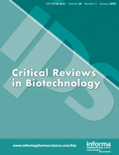
CRITICAL REVIEWS IN BIOTECHNOLOGY
Elevating Biotechnological Discourse with Rigorous ReviewsCRITICAL REVIEWS IN BIOTECHNOLOGY, published by Taylor & Francis Ltd, stands as a leading journal in the field of biotechnology, consistently recognized for its rigorous peer-reviewed articles that impact the disciplines of Applied Microbiology, Biotechnology, and Medicine. With an impressive Q1 ranking in these categories and a significant influence reflected in its Scopus rankings—placing it within the top 5% of Applied Microbiology and the top 4% of Biotechnology journals—the journal serves as an essential resource for researchers, professionals, and students alike. Launched in 1983 and extending its coverage to encompass groundbreaking findings through 2024, it provides a rich forum for insightful reviews and innovative research that propel the field forward. Though not an Open Access journal, CRITICAL REVIEWS IN BIOTECHNOLOGY remains a vital point of reference for ongoing developments, critical analyses, and emerging trends, making it indispensable for those seeking to stay at the forefront of biotechnological advancements.

WORLD JOURNAL OF MICROBIOLOGY & BIOTECHNOLOGY
Transforming Science Through Microbiology and BiotechnologyWORLD JOURNAL OF MICROBIOLOGY & BIOTECHNOLOGY, published by Springer, serves as a pivotal forum for advancing the fields of microbiology and biotechnology since its inception in 1990. Located in the Netherlands, this esteemed journal has secured a prominent position in the academic landscape, recognized for its strong impact factor and prestigious Q2 category rankings across disciplines such as Applied Microbiology, Biotechnology, and Physiological Sciences. Researchers and professionals utilize this journal to disseminate innovative findings and explore emerging technologies that are transforming the scientific landscape. With a robust submission rate and high visibility among the academic community, the journal fosters interdisciplinary collaboration, encouraging discussions that bridge gaps between theory and practical applications. As it converges into 2024, the WORLD JOURNAL OF MICROBIOLOGY & BIOTECHNOLOGY continues to be a vital resource for scholars aiming to enhance our understanding of microbial processes and biotechnological advances.
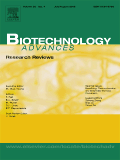
BIOTECHNOLOGY ADVANCES
Transforming Knowledge into Biotechnological AdvancesBIOTECHNOLOGY ADVANCES is a premier, peer-reviewed journal published by PERGAMON-ELSEVIER SCIENCE LTD, dedicated to advancing knowledge in the rapidly evolving fields of biotechnology and bioengineering. With an ISSN of 0734-9750 and an E-ISSN of 1873-1899, this esteemed journal covers a wide spectrum of topics relevant to applied microbiology, molecular biology, and biochemical innovation. Recognized for its academic rigor, it holds a distinguished position in the top quartile (Q1) in multiple categories, including Applied Microbiology and Biotechnology, Bioengineering, and Biotechnology, further evidenced by its high rankings in Scopus, where it ranks #3/127 in Applied Microbiology and Biotechnology and #7/311 in Biotechnology. Researchers and professionals in the field value the journal not only for its comprehensive coverage of cutting-edge research but also for its commitment to disseminating critical findings and fostering collaboration. While BIOTECHNOLOGY ADVANCES currently operates under a subscription model, its potential impact on future innovations in biotechnology cannot be overstated, making it an essential resource for anyone interested in the forefront of biotechnological advancements.
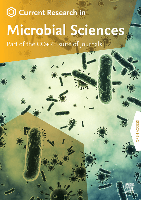
Current Research in Microbial Sciences
Unveiling Insights in Microbiology and Infectious DiseasesCurrent Research in Microbial Sciences is a distinguished peer-reviewed journal published by Elsevier, focusing on the dynamic and rapidly advancing fields of microbiology and infectious diseases. With an ISSN of 2666-5174, this journal has established itself as an essential resource for researchers, professionals, and students alike, offering the latest findings and insights from 2020 to 2024. The journal holds a significant position in the academic landscape, achieving a Q2 ranking across multiple categories, including Immunology and Microbiology, Infectious Diseases, and Medical Microbiology, demonstrating its impact in these critical areas of study. With impressive Scopus rankings—such as being placed in the 94th percentile for Immunology and Microbiology—current research is well-supported by a thriving scientific community. Although the journal is not open access, it serves as a vital platform for disseminating high-quality research and fostering collaboration within the microbial sciences. Engaging with this journal enables professionals and researchers to stay abreast of innovations and contribute to the collective body of knowledge that shapes our understanding of microbial interactions and infectious diseases.

ANNALS OF MICROBIOLOGY
Innovating in microbiological science for a healthier world.ANNALS OF MICROBIOLOGY is a prestigious journal dedicated to advancing the field of microbiological research, published by BMC, renowned for its commitment to providing open access to vital scientific findings. With its ISSN 1590-4261 and E-ISSN 1869-2044, this journal provides a platform for the dissemination of high-quality research since its inception in 1997. Renowned for its rigorous peer-review process, it has attained a commendable Q2 ranking in the Applied Microbiology and Biotechnology category in 2023, reflecting its significant contributions to the discipline. Positioned within the 67th percentile among its peers in Scopus rankings, ANNALS OF MICROBIOLOGY continues to facilitate the exchange of innovative ideas and methodologies, serving as an essential resource for researchers, professionals, and students alike. The journal covers a broad spectrum of topics, emphasizing the intersection of microbiology with applied sciences, thereby fostering an environment that encourages collaboration and advancement in this vital field. Scholars seeking to stay at the forefront of microbiological studies will find ANNALS OF MICROBIOLOGY an invaluable addition to their academic pursuits.
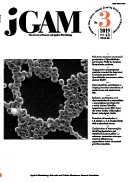
JOURNAL OF GENERAL AND APPLIED MICROBIOLOGY
Exploring the vital role of microorganisms in health and environment.JOURNAL OF GENERAL AND APPLIED MICROBIOLOGY, published by the MICROBIOL RES FOUNDATION, is a vital resource in the fields of applied microbiology and biotechnology, as well as in diverse medical applications, serving an academic community dedicated to advancing microbial science. Established in 1955, this journal has a rich history of disseminating innovative research and insights into the intricate world of microorganisms. With an ISSN of 0022-1260 and an E-ISSN of 1349-8037, the journal maintains high scholarly standards and robustness, reflected in its 2023 Scopus rankings placing it in the Q3 and Q4 quartiles within its categories. While primarily based in Japan, the journal engages a global audience, offering valuable contributions that inform both theoretical perspectives and practical applications in microbiology. Despite being a non-open-access publication, it provides pivotal research findings essential for academics, professionals, and students alike, fostering a deeper understanding of microbial impact on health and the environment.

Microorganisms
Innovating discoveries in microbiology and virology.Microorganisms is a leading open-access journal published by MDPI based in Switzerland, catering specifically to the rapidly evolving fields of microbiology and virology. Since its inception in 2013, the journal aims to foster the dissemination of high-quality research through its comprehensive and interdisciplinary platform, with a particular focus on both fundamental and applied microbiological sciences. Contributing to its esteemed reputation, Microorganisms holds a commendable Q2 ranking in the categories of Microbiology and Virology, as well as in Medical Microbiology, highlighting its significance in the academic community. With a consistent impact, evidenced by its rankings in Scopus—such as rank #25 in Virology and #56 in Microbiology—the journal serves as an invaluable resource for researchers, professionals, and students looking to stay at the forefront of microbiological research. As an open-access journal, Microorganisms ensures that vital research findings are readily available to a global audience, promoting collaboration and innovation in the study of microbial life and its implications for health and disease.
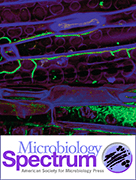
Microbiology Spectrum
Empowering discoveries in microbiology and beyond.Microbiology Spectrum is a prominent peer-reviewed journal published by the American Society for Microbiology, dedicated to advancing the field of microbiology through the dissemination of high-quality research. Since its inception in 2013 and continuing until 2024, the journal has established a strong presence in key domains such as microbiology, immunology, cell biology, and ecology, achieving impressive quartile rankings including Q1 in Infectious Diseases and Q1 in Immunology and Microbiology as of 2023. With an emphasis on open access to its scholarly content, Microbiology Spectrum aims to foster collaboration and knowledge sharing among researchers, professionals, and students alike. The journal's scope encompasses a diverse range of topics pertinent to the field, making it an essential resource for anyone involved in microbiological research and its applications. Researchers looking to publish their findings in a respected journal will find Microbiology Spectrum's robust impact factor and Scopus rankings serve as testament to its significance and influence within the academic community.

APPLIED MICROBIOLOGY AND BIOTECHNOLOGY
Exploring the frontiers of microbial innovation.Applied Microbiology and Biotechnology, an esteemed journal published by Springer, serves as a vital resource in the domains of microbiology and biotechnology. With an impressive impact factor reflecting its quality, the journal holds Q1 rankings in various categories including Applied Microbiology and Biotechnology, Biotechnology, and Medicine (Miscellaneous) as of 2023. Spanning the years from 1984 to 2024, it underscores its commitment to disseminating groundbreaking research that addresses pressing challenges in health, agriculture, and environmental sustainability. The journal is rigorously indexed and holds respectable positions in Scopus rankings, notably within the top 15% of Applied Microbiology and Biotechnology and the top 15% in Biochemistry, Genetics, and Molecular Biology. Although it is not Open Access, its comprehensive articles, reviews, and short communications are indispensable for researchers, professionals, and students eager to advance their understanding and application of microbial processes and biotechnological innovations in real-world contexts.

Microbiology Research
Advancing the Frontiers of Microbial ScienceMicrobiology Research, published by MDPI, stands as a pivotal open-access journal in the field of microbiology, having established its presence since 2010. Based in Switzerland, this journal strives to provide a platform for innovative research and cutting-edge findings in various branches of microbiology, including medical microbiology and molecular biology. With an impact factor that reflects its dedication to scholarly excellence, Microbiology Research is classified in the Q3 category for both microbiology and medical microbiology, and Q4 for molecular biology as of 2023, indicating its growing importance and outreach within these domains. The journal aims to foster discussion and collaboration among researchers, professionals, and students by presenting articles that cover a wide array of topics and methodologies in microbiological research. Leveraging its open-access model, Microbiology Research ensures that high-quality research is accessible to a global audience, thus facilitating the advancement of knowledge and innovation in the microbial sciences.